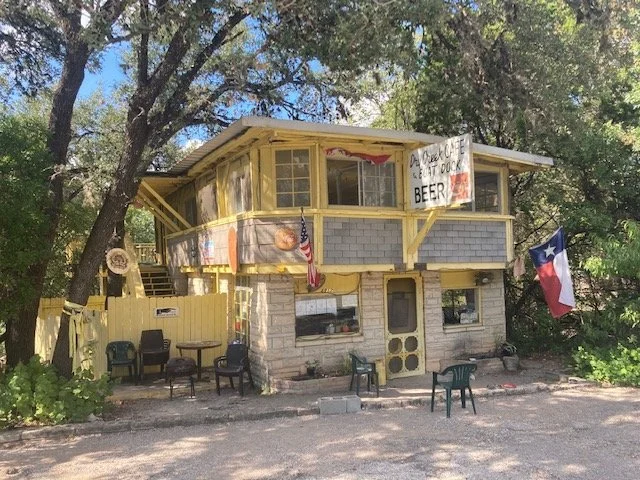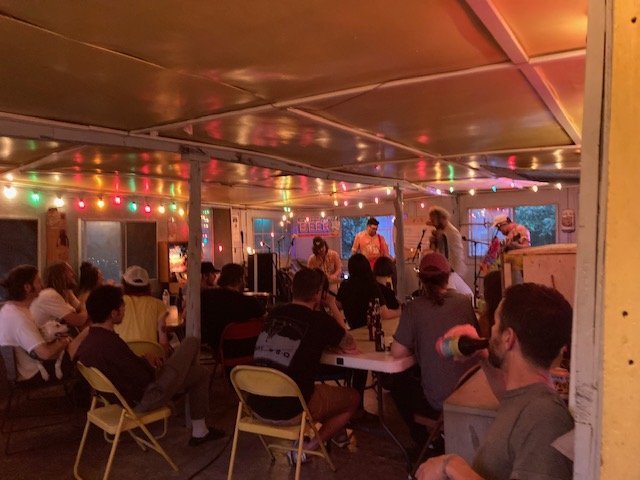Last Days of Dry Creek Cafe
BY MARY KAHLE, PRESERVATION AUSTIN FALL 2021 POLICY INTERN
Dry Creek Cafe, ca. 1979 (source unknown)
Mt. Bonnell Road is a popular route for a variety of reasons, whether you’re a tourist seeking Mt. Bonnell’s dramatic views, a biker enjoying a Saturday ride, a car enthusiast testing the curves, or simply a commuter avoiding Mopac. Regardless, you can’t miss Dry Creek Cafe & Boat Dock, a beloved dive bar that has nurtured cedar choppers, hippies, UT students, and everyone in between for nearly seventy years. Set to close on October 31 due to a change in the property’s ownership, this legacy business’s storied history makes it an unforgettable Austin treasure.
Nestled in the trees at 4812 Mt. Bonnell Road, Dry Creek Cafe was built sometime before 1950, and, according to legend, with “100% ‘appropriated’ materials.” Beloved Austin American-Statesman columnist John Kelso wrote in 1980 that its architectural style was “Early Hooverville.” That said, the vernacular building has unmistakable elements of mid-century architecture, including horizontal lines, a low-pitched roofline, and windows with a large glass area. The original building lacked the upper deck and pool room that became integral to its reputation as a place for listening to live music and watching the sunset, the latter of which was fun just as long as the deck didn’t collapse while you were on it. An early photo of the business shows its name as the Triple B (“BBB”). This was before the owner sold it to his sister Sarah Boyd Ransom in 1956, when it began its fabled run as the Dry Creek Cafe.
Dry Creek Cafe, 2021 (photo courtesy of Mary Kahle)
When Sarah died at ninety-five in 2009, her grandson Sheldon Boyd Reynolds wrote in The Austin Chronicle:
At this time [the 1950s], her business existed for the local Hill Country citizens ("cedar choppers"). This was when she developed her tough manner and colorful language. In the 1970s, when the drinking age was lowered to 18, the college crowd discovered the Dry Creek. At this time, Austin's Sixth Street was not fashionable nor developed as a college hangout. Her business boomed, and she served a great hamburger. They saw a crusty woman and saw her as their second mother. She ran the business for 50 years by herself, and therefore you were always told to bring your bottle back down. No empty bottle, no more beer. This also prevented people from throwing the bottles off the deck of the bar.
The early years reflected Dry Creek’s remote location on the city’s outskirts, with a rotating stable of pets and characters. A 1958 classified ad in the Statesman says, “LOST – OLD crooked tail Siamese cat from Dry Creek Cafe. Mount Bonnell Road. GL3-9924. Reward. Kittens.” Tido the poodle was reported lost in 1962, and in 1966, Sarah’s pet cockatiel “Hot Rod” flew off. In what is surely a watershed moment in Austin’s history as a haven for weirdness, Dry Creek Cafe had a six-foot pet alligator living in a nearby slough of Lake Austin. Killed in 1967 by a lake patrolman after a frightened kayaker spotted it, “Old Bulger” began living at Dry Creek when Sarah’s brother Harry brought it (at six inches) from New Orleans in 1949. Said Sarah, Old Bulger “‘never bothered anybody, but he’d bellow like a bull about 6 a.m. … My eight grandchildren watched him all the time. He’d move to the dock near the cafe and sleep in the wintertime.’”
In April 1960 the Statesman reported that fugitive killer Joseph Corbett Jr. of Los Angeles was spotted at Dry Creek, “said to be driving a 1959 or 1960 model Thunderbird car.” Known for its perilous, scenic switchbacks, Mt. Bonnell Road has long attracted cyclists, and in 1980 Dry Creek Cafe was the kickoff site for the Mount Bonnell Hill Climb, a race to the top of the legendary overlook. By then, Sarah’s notoriety as a curmudgeon was well established; John Kelso headlined his 1980 piece “Ole’ Sarah could humble Oscar the Grouch.”
Dry Creek Cafe, 2021 (photo courtesy of Mary Kahle)
But that was a major part of its appeal, along with the casual, hodgepodge atmosphere that patrons came to love. Regulars included fans of live music, such as in-house band Cactus Lee, or friends just wanting to sit out by the front door and chat. Children have always been welcome, too, and a recent night found a young family playing board games on the deck while a band performed in the pool room. Even Tinder recommended Dry Creek for dates, calling it “a good, old-fashioned dive bar … with cheap beers, a killer jukebox, worn-down pool table, and views beautiful enough to make all the outdoor smoking tolerable.”
Sarah sold the property to a family member in 1984 when the City of Austin incorporated the site and surrounding area. In more recent years, Dry Creek had another beloved barkeep, Angel Altenhofel, who established a reputation in her own right. When she died in 2020, staff and friends held a gathering at “the Creek” in her honor, reflecting the sense of family and community that has always been its most important feature. For now, there are no plans to raze the building, and the new owners are floating various ideas for its future use. Austinites who’ve loved Dry Creek can continue to appreciate its iconic status through the friendships and memories forged on its rickety chairs and to the bars of its music, remembering a piece of Austin that has so enriched our city.
Cactus Lee will be performing on the final night, October 31st, from 5-8 p.m. Follow Dry Creek Cafe on Instagram for information on the show and that night’s live auction of “everything in the bar.”
MARY KAHLE IS PRESERVATION AUSTIN’S FALL 2021 POLICY INTERN. SHE IS A GRADUATE STUDENT IN PUBLIC HISTORY AT TEXAS STATE UNIVERSITY.



